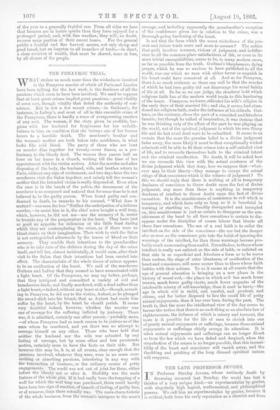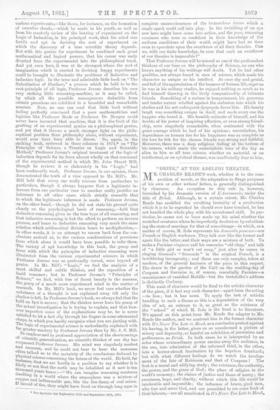THE LATE PROFESSOR JEVONS.
JN Professor Stanley Jevons, whose untimely death by drowning occurred last Sunday, the world has lost a thinker of a very unique kind,—an experimentalist by genius, with singularly high logical, mathematical, and philosophical powers. We call him an experimentalist by genius, because it is evident, both from his early reputation as a chemist and from various experiments,—like those, for instance, on the formation of cumulus clouds,—which he made in his youth, as well as from his masterly review of the bearing of experiment on the Logic of Induction, in his principal work, that his mind was fertile and apt in devising the sort of experiment on which the discovery of a true scientific theory depends. But with this genius for experiment he combined such great mathematical and logical powers, that his career was early diverted from the experimental into the philosophical track. And yet even here, it was at its strongest where the sort of imagination which is exerted in devising happy experiments tould be brought to illustrate the problems of deductive and inductive logic. In the terse and admirable little book on "The Substitution of Sitnilars," a process which he held to be the root-principle of all logic, Professor Jevons describes his own very striking little reasoning-machine, as it may be called, by which all the possible consequences deducible from -certain premisses are exhibited in a beautiful and remarkable manner. Now, no one can read that little book without feeling perfectly convinced that a pure mathematiCian and logician like Professor Boole or Professor De Morgan could never have invented that machine, that it is the fruit of the grafting of an experimental genius on a philosophical genius, ,and yet that it throws a much stronger light on the philo- sophical problem than philosophy alone, without experiment, would ever have been able to throw. So, again, in the striking book, reviewed in these columns in 1874,* on "The Principles of Science, a Treatise on Logic and Scientific Method," Professor Jevons's original treatment of the logic of induction depends for its force almost wholly on that command .of the experimental method in which Mr. John Stuart Mill, though he reviews it so elaborately in his "Logic," had been confessedly weak. Professor Jevons, in our opinion, there demonstrated the truth of a view opposed to Mr. Mill's. Mr. Mill held that every one really reasons from particulars to particulars, though it always happens that a legitimate in- ference from one particular case to another really justifies an inference to all other eases which strictly resemble that to which the legitimate inference is made. Professor Jevons, on the other hand,—though he did not state his ground quite dearly on the psychological basis of reasoning,—held that deductive reasoning gives us the true type of all reasoning, and that inductive reasoning is but the effort to perform an inverse process, and bears to deductive reasoning very much the same relation which arithmetical division bears to multiplication,— in other words, it is an attempt to reason back from the con- -elusions arrived at, to the various combinations of premisses -from which alone it would have been possible to infer them. The variety of apt knowledge in this book, the grasp and force with which the principles of inductive reasoning were illustrated from the various experimental sciences in which Professor Jevons was so profoundly versed, were beyond all praise. In Mr. Mill's "Logic," we find the analysis of a most skilful and subtle thinker, and the exposition of a 'lucid reasoner ; but in Professor Jevons's "Principles of ;Science," we find, with less of fluent beauty in the manner, the grasp of a much more experienced mind in the matter of research. In Mr. Mill's book, we never feel sure whether the .substance of a thought is not explained away till only the 'shadow is left. In Professor Jevons's book, we always feel that the hold on fact is secure ; that the thinker never loses his grasp of the actual investigation he is trying to explain, and that how- -ever imperfect some of the explanations may be, he is never satisfied to let a fact slip through his fingers in some attenuated 811sPe, in which you hardly recognise what you are parting with,
logic of experimental science is undoubtedly explained with 1061:greater mastery by Professor Jevons than by Mr. J. S. Mill.
,-1/1 candour and in profound appreciation of the shortcomings 6of scientific generalisation, no scientific thinker of our day has :surpassed Professor joyous. His mind was singularly modest ta',.1..a reverent, and he could not bear to hear the nonsense
,
nen talked as to the certainty of the conclusions deduced by PhYsical science concerning the future of the world. He held, fer instance, that we are hardly in a position to say whether it is °r unt that the earth may be inhabited as it now is ten thousand
dwelling a
Years hence .—" We can imagine reasoning creatures world Where the atmosphere was a mixture of ygenau inflammable gas, like the fire-damp of coal mines. If devoid of fire, they might have lived on through long ages in
*
$ee Spectator for September 17th and September 2611,, 1874.
complete unconsciousness of the tremendous forces which a single spark could call into play. In the twinkling of an eye new laws might have come into action, and the poor, reasoning creatures who were so confident in their knowledge of the uniform conditions of their world, might have had no time oven to speculate upon the overthrow of all their theories. Can we, with our finite knowledge, be sure that such an overthrow of our theories is impossible ?"
That Professor Jevons will be missed as one of the profoundest thinkers of our time on the philosophy of Science, no one who knows anything of his writings will doubt. Yet he had other qualities, not always found in men of science, which made his character as unique as his intellect. At once shy and genial, and full of the appreciation of the humour of human life, eager as he was in his solitary studies, he enjoyed nothing so much as to find himself thawing in the lively companionship of intimate friends. Something of a recluse in temperament, his generous and tender nature rebelled against the seclusion into which his studies and his not unfrequent dyspepsia drove him. His hearty laugh was something unique in itself, and made every one the happier who heard it. His humble estimate of himself, and his doubts of his power of inspiring affection, or even strong friend- ship, were singularly remarkable, when contrasted with the great courage which he had. of his opinions ; nevertheless, his dependence on human ties for his happiness was as complete as the love he felt for his chosen friends was strong and faithful. Moreover, there was a deep religious feeling at the bottom of his nature, which made the materialistic tone of the day as alien to him as all true science, whether on material, or on intellectual, or on spiritual themes, was unaffectedly dear to him.































 Previous page
Previous page